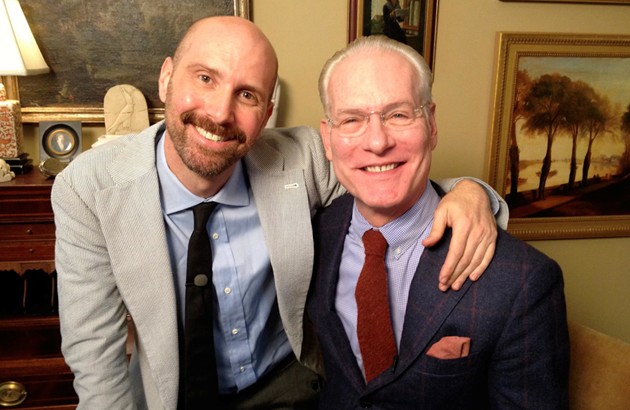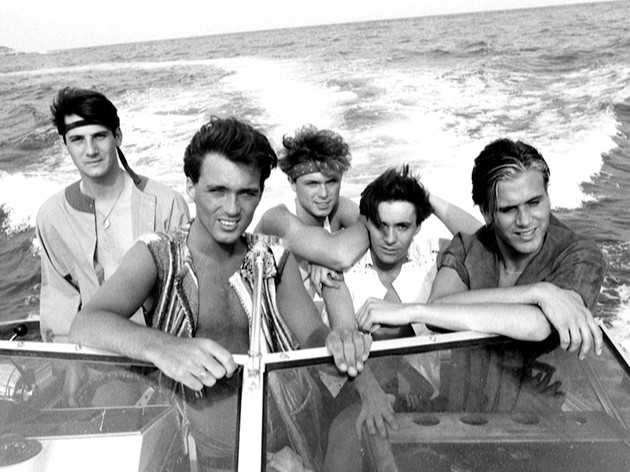DO I SOUND GAY? (David Thorpe) *OPENING NIGHT
Despite the seemingly flippant and trivial query that forms the title of this concise, witty film, it goes much deeper into the negative associations attached to “sounding gay,” marshaling examples from pop culture history and expert opinions from the likes of Margaret Cho, George Takei, Tim Gunn, Dan Savage, and David Sedaris. Thorpe’s recent breakup and anxiety over being single fuels his quest for self-improvement, which has him consulting speech experts, friends, celebrities, and strangers on the street. The persistence and pervasiveness of homophobia (and a related sense of misogyny) that informs gay men’s relations with one another and how they feel about themselves, is the unspoken “elephant in the room” that Thorpe perceptively unpacks.
(Nov. 13, 7pm, 7:30pm)
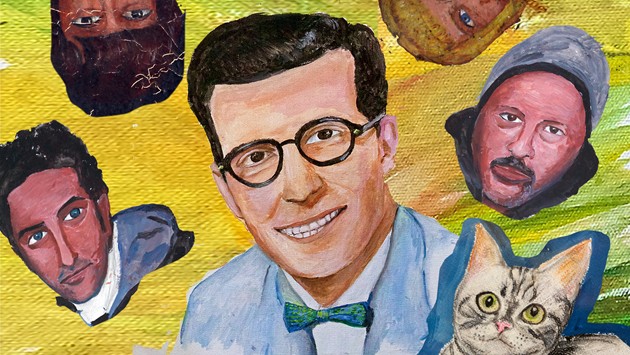
ALMOST THERE (Dan Rybicky and Aaron Wickenden)
Wading into the thorny thickets of what becomes a co-dependent relationship (as one person in the film explicitly points out) between documentary filmmakers and their subjects, Almost There also raises issues of elder care, mental illness, outsider art, and exploitation. Peter Anton, the octogenarian artist at the center of the story, has an uncanny knack to pull people into his needy orbit, as he paints while living in unimaginable filth and squalor, while at the same time repelling them just as much. Peter Pan is appropriately evoked here, as Anton is essentially a man who’s never really grown up, and has come to live his life in a way that is almost wholly dependent on others. As engrossing the story’s twists turn out to be, its success as a compelling portrait is mitigated by how often we’re made to cringe at what we see. Also, there seems to be a mistaken belief on the part of the filmmakers that acknowledging ethical issues equals mitigating them.
(Nov. 15, 6:45pm; Nov. 17, 1pm)
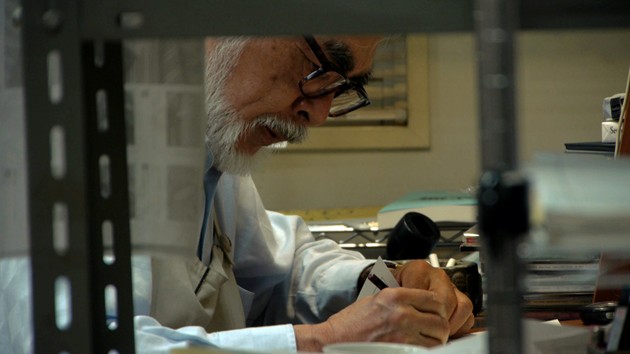
THE KINGDOM OF DREAMS AND MADNESS (Mami Sunada)
This delightful, moving and lyrical film takes us inside the magic-making factory of Studio Ghibli, the famed Japanese animation studio that brought the world such enduring classics as My Neighbor Totoro, Grave of the Fireflies, Spirited Away, My Neighbors the Yamadas, and many others. The recent news of the studio’s decision to wind down feature film production renders this film a requiem for the artistry that was a hallmark of these beautiful works. It’s also a twin portrait of the studio’s co-founders and chief directors, Hayao Miyazaki and Isao Takahata. We follow the process of the creation of both men’s final films: Miyazaki’s The Wind Rises and Takahata’s The Tale of the Princess Kaguya. Miyazaki is a much stronger presence in the film than Takahata, most likely because Takahata may have not been doing much of anything during the documentary’s time frame; in contrast to Miyazaki’s clockwork organization, Takahata has a reputation for always being late and over budget. The third crucial figure is Studio Ghibli producer Toshio Suzuki, the main driving force of the studio, the one who struggles to corral his temperamental artists, and the glue that holds the whole operation together. Ghibli fans and neophytes alike will find much to treasure here; in this case, seeing how the sausage is made will make one enjoy its flavor all the more.
(Nov. 16, 11:45am)
SOME KIND OF SPARK (Ben Niles)
This film follows six kids, ages 8-12, over a three-year period as they go through Julliard’s Music Advancement Program (MAP), an outreach program conducted by the institution offering music instruction and mentorship to kids in underserved areas of New York City. Even though the effect is ultimately quite inspiring, Niles very admirably doesn’t go for hackneyed, cheap uplift techniques, instead going into great detail about how the teachers in the program instruct and inspire their students, pushing them to the limits of their talents and beyond. The powerful point made here is that music instruction is something that is deserved by, and beneficial to, all children no matter their background, and not just for prodigies and cultural elites.
(Nov. 16, 2pm)
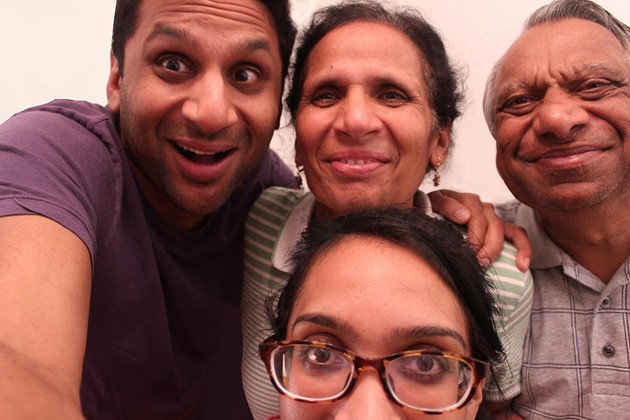
MEET THE PATELS (Geeta V. Patel and Ravi V. Patel)
Ravi Patel is an actor and first-generation Indian-American who is approaching 30 and is under increasing pressure by his parents to marry a nice Indian girl, preferably one also named Patel, and one with the right family background, education, and skin complexion. Unbeknownst to his parents, he has had a secret relationship with (horror of horrors) a white American woman, who he recently broke up with, though he still harbors feelings for her. Patel submits himself to his parents’ extensive search for an Indian bride, taking him across the U.S., and also to Canada and India. Patel’s sister Geeta, who also has her own marriage pressures, gets behind the camera to document her brother’s quest to please his parents. The Patels have come up with a compelling and humorous look at the tensions between tradition and modernity, as well as generational conflicts, ultimately arriving at the importance of being true to one’s own identity, needs, and desires.
(Nov. 16, 7pm; Nov. 17, 5:15pm)
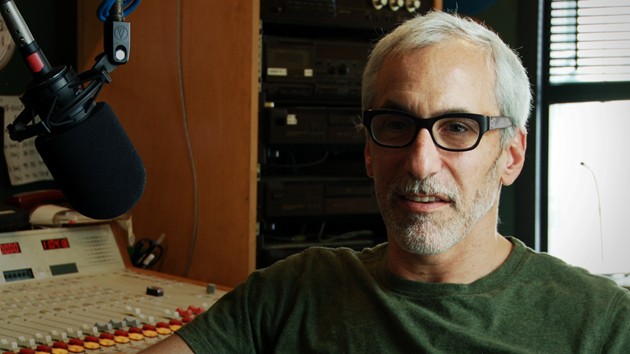
SEX AND BROADCASTING: A FILM ABOUT WFMU (Tim K. Smith)
WFMU, broadcasting out of New Jersey, has defiantly remained an independent, commercial-free, non-corporate, listener-supported public radio station since the 1950’s. The station has been committed to free-form, (almost) anything-goes, iconoclastic, unstructured programming that has allowed it to carve a unique niche in the radio landscape, which has given it an appreciate audience and introduced listeners to unique (and often very weird) talents. The drawback to this approach is that the station is constantly on the brink of financial ruin, each time just barely bailed out by their loyal listeners. Also, the station’s most popular talents almost inevitably leave, eventually tiring of working for free. The film’s central character is station manager Ken Freedman, who became so enamored of the station as first a fan, and then an employee, that he ended up buying the station. We follow Freedman as he tirelessly works to keep the station alive, and as he contends with a severe budget shortfall, necessitating a special listener drive to avert this potential financial disaster. Sex and Broadcasting vividly affirms the unending relevance and vitality of the medium of radio, even in this modern, advanced age.
(Nov. 15 5pm; Nov. 17, 3:15pm; Nov. 20, 9:45pm)
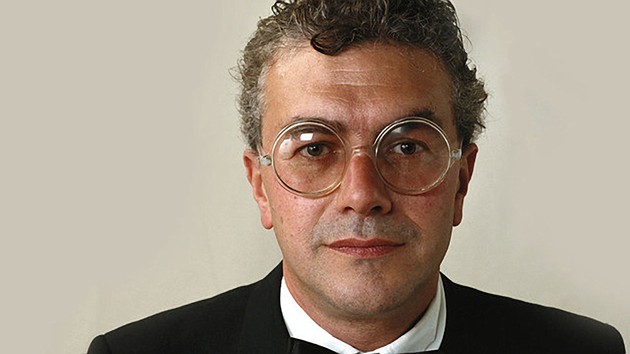
THE LAST IMPRESARIO (Gracie Otto)
Chances are you’ve never heard of stage and film producer Michael White. But you’ve probably heard of some of the works he’s helped shepherd to London’s West End, Broadway, and to movie screens worldwide: Oh! Calcutta!, The Rocky Horror Picture Show, Monty Python and the Holy Grail. The Last Impresario finally gives this pioneering producer his due, charting his rise and his influence, still felt to this day by artists and others in the business who still admire him and feel grateful to him for helping their careers to blossom. White was equally comfortable in both commercial and avant-garde artistic circles, and had a unique eye for discovering talent and identifying cultural trends. But eventually the times passed him by, and he often got burned by trusting in the wrong people; in his latter days, he is forced to auction off valuable memorabilia to make ends meet. But White never feels sorry for himself; he remains an irrepressible, magnetic personality whose life story is nearly as entertaining as the works he brought into fruition.
(Nov. 20, 7:30pm)
SOUL BOYS OF THE WESTERN WORLD (George Hencken)
This is the story of popular 80’s band Spandau Ballet – who created such era-defining hits as “True” and “Gold” – told in their own words. The film takes us through their origins and influences, the highs and lows of their band’s existence, and the squabbles that eventually dissolved the group. The film will have its greatest value for nostalgic fans – “True” no doubt graced many a prom or wedding party during the 80’s. But for those who require thorough musical context, or a band story that rises above the level of a “Behind the Music” episode, this documentary leaves much to be desired. Most baffling is the fact that there’s no mention at all of the New Romanticism pop-culture movement in England, a major post-punk music and fashion phenomenon that Spandau Ballet was a key part of. Some more perspective would have added some more interesting and deeper dimensions to this story.
(Nov. 15, 9:45pm)



















